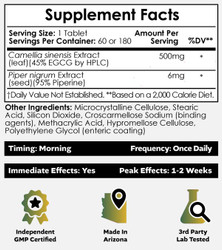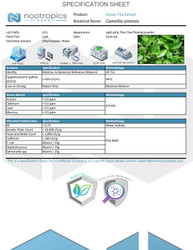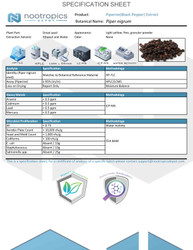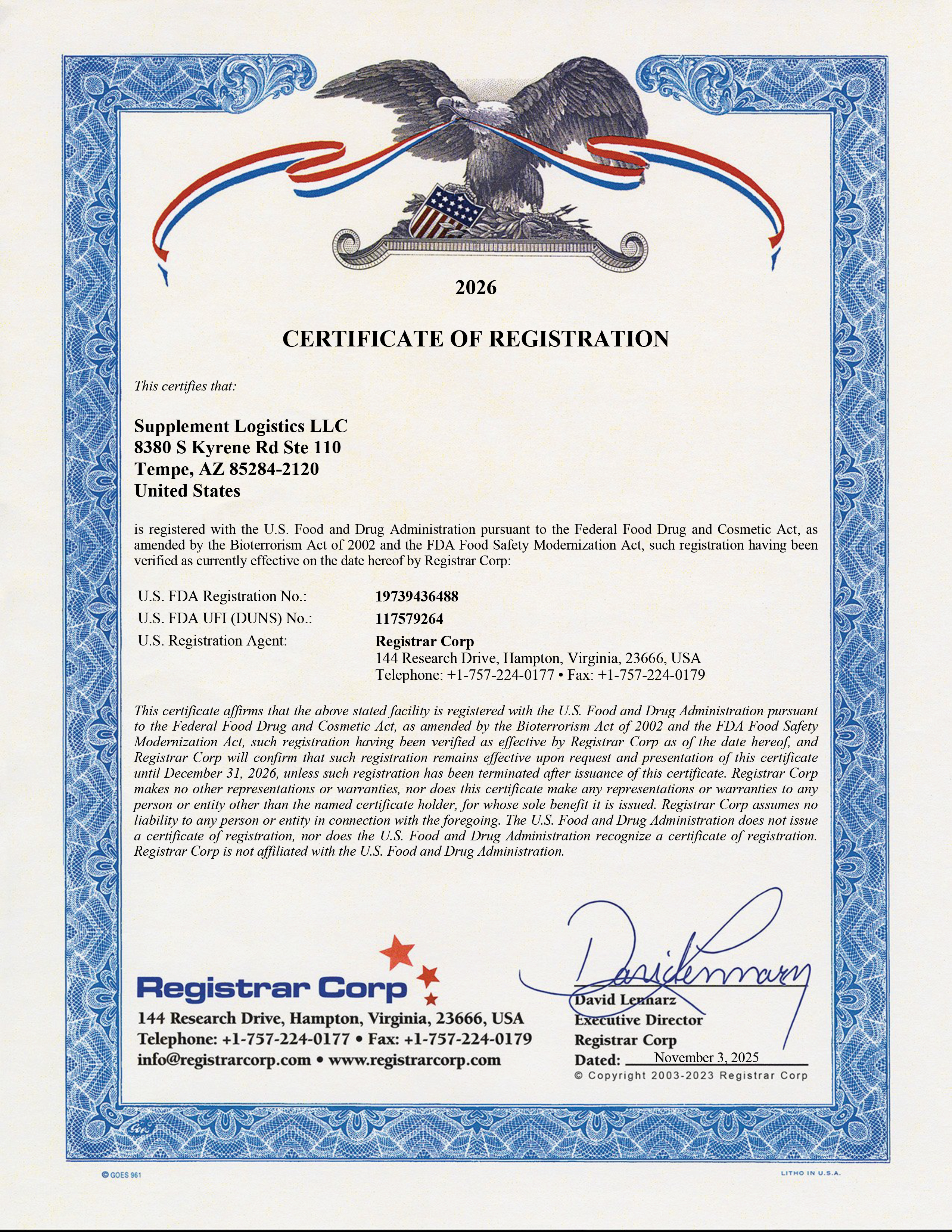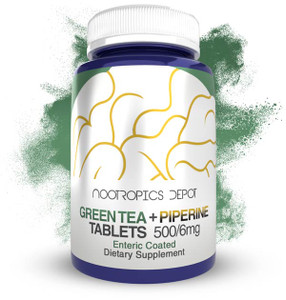





Green Tea Extract Tablets | 45% EGCG + 6mg Piperine
Your order will be shipped tomorrow
Product Usage
506mg (One Tablet)
Morning
Empty Stomach
1 Time Daily
What is Green Tea Extract?
Green Tea Extract, made from the Camellia sinensis plant, has a history of use across the Asian continent; though the very first use originated in traditional Chinese practices. Green Tea is actually made from the same leaves used to make oolong tea, black tea and white tea. The difference, however, is that the Camellia sinensis leaves that are used to make Green Tea Extract have not undergone the same withering and oxidation process as its counterparts.
Green Tea Extract has become a popular supplement due to the wide range of Green Tea Extract benefits believed to be obtained via its polyphenols, also known as Catechins. Catechins have been shown in some research to help promote metabolic function.* Other evidence suggests Green Tea Extract helps promote balanced oxidation levels and even carries properties to help support the immune system.* It may also support cardiovascular health.*
Green Tea Extract Benefits and Uses
-
May help support metabolic function*
- May help promote cardiovascular health*
- May help support cellular function*
- May help promote immune system function*
- May help support balanced oxidation levels*
What Are Green Tea Extract Catechins And Why Are They Important?
Green Tea Extract benefits are largely credited to its Catechins. Green Tea Catechins are made up of the four molecules listed below, the most potent of which is believed to be EGCG (Epigallocatechin Gallate). Epicatechin and Epigallocatechin, pictured below, can become acylated with gallic acid to form gallates. The best Green Tea Extract supplements available to buy usually specify their Catechin and/or EGCG content. Without that information available, it is difficult to know if a particular Green Tea Extract supplement has high EGCG content or is simply ground up or powdered tea leaves.
-
Epicatechin
-
Epigallocatechin
-
Epicatechin Gallate
-
Epigallocatechin Gallate
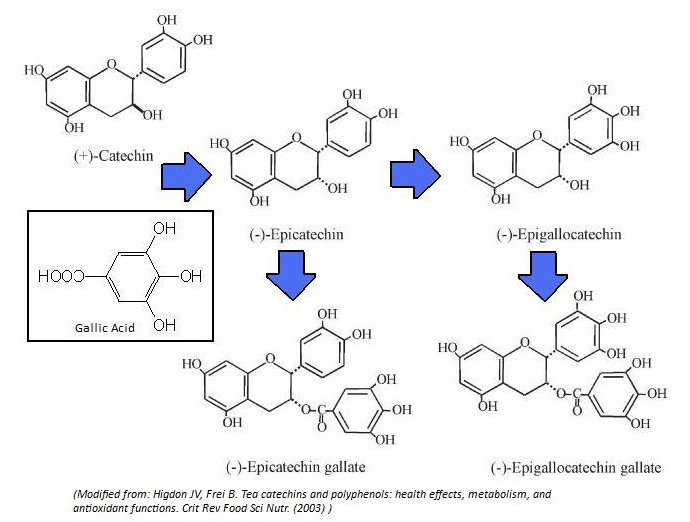
Why is EGCG Important?
EGCG is the primary Catechin of interest since it is believed to be the most potent and therefore one of the better Catechins to analyze and study its role in Green Tea Extract effects. Several studies have suggested that the EGCG benefits in Green Tea Extract may help defend brain cells against oxidative stress and therefore may promote overall brain function and task performance.*
EGCG has also been researched for its purported effects on related Green Tea Extract weight loss benefits and overall fitness.* The Catechins in Green Tea Extract have been shown to promote thermogenesis, a metabolic process in which our bodies burn calories to produce heat.* Researchers believe this process may help produce a Green Tea Extract weight loss effect.* An additional study featuring over a dozen runners who took a Green Tea Extract supplement for 4 weeks determined that the Green Tea Extract supplement promoted a higher level of protection against oxidative stress from repeated sprinting.*
Why Enteric Coated Green Tea Extract with Piperine?
Green Tea Extract which has a high EGCG content is a great supplement, however, absorption of EGCG is not fantastic. With this in mind, we dove into the research behind EGCG absorption, to figure out a way to unlock the best possible bioavailability. This led to utilizing an enteric coating and a targeted 6 mg dose of Piperine.
You may be asking, what’s the benefit of an enteric coating? Well, an enteric coating keeps EGCG protected while it passes through the stomach. While EGCG is stable in gastric environments, it can interact with food which can slow its absorption. This effect is called the food matrix effect. EGCG is only absorbed in the intestines, so bypassing the stomach through an enteric coating makes the most sense for achieving maximum bioavailability.
We also added Piperine because Piperine helps regulate absorbed EGCG from being pumped back out into the intestines. Piperine achieves this by blocking the function of p-glycoprotein, which is mainly responsible for pumping absorbed EGCG back into the intestines. Piperine also helps regulate glucuronidation of EGCG, which further promotes bioavailability. Overall, the combination of an enteric coating and Piperine, significantly amplifies the Green Tea Extract benefits!*
Does Green Tea Extract have Caffeine?
While it's reported that one brewed cup of Green Tea may contain anywhere from 35-100mg of Caffeine, the overall caffeine content of high EGCG is at negligible amounts. This means that Green Tea Extract will not produce any Caffeine benefits. That being said, our Green Tea Extract goes great with a source of Caffeine, like our Caffeine L-Theanine capsules!
How Much EGCG is in Green Tea Extract?
This Green Tea Extract supplement contains a minimum 45% EGCG content.
Green Tea Extract Stacks
Check out our recommended Green Tea Extract stacks, that help further amplify Green Tea Extract benefits!
Balanced Oxidation Levels Stack: Green Tea Extract + Piperine with EZ Mega Fish Oil.
This combination promotes a dual mechanism approach to balancing oxidation levels. EZ Mega Fish oil may also help promote the bioavailability of Green Tea Extract.*
Relaxation Stack: Green Tea Extract + Piperine with L-Theanine
L-Theanine combined with Green Tea Extract + Piperine helps support a good mood and relaxation while balancing stress levels throughout the day.*
Cognition Stack: Green Tea Extract + Piperine with Polygala
Green Tea Extract + Piperine combined with Polygala promotes a nice uplifting mood, focused yet smooth stimulation that will keep you dialed in and attentive without feeling overly stimulated.*
Green Tea Extract Dosage
As a dietary supplement, take one 500mg enteric coated Green Tea Extract tablet with Piperine once daily.
Green Tea Extract Reviews
To gain more insight, read the enteric coated Green Tea Extract tablets with Piperine reviews and experiences below.
Where to Buy Green Tea Extract Standardized to EGCG Content
Nootropics Depot offers 60ct. and 180ct. jars of high quality enteric coated Green Tea Extract tablets with Piperine. Nootropics Depot's enteric coated Green Tea Extract tablets with Piperine have been lab-tested and verified for both product purity and identity.
| *Attention: These statements have not been evaluated by the Food and Drug Administration. This product is not intended to diagnose, treat, cure or prevent any disease. |
Lab Testing Results / Certificate of Analysis (COA)
Trust Through Transparency
Your health matters, which is why we only use the best 3rd party ISO accredited labs and cGMP certified and FDA registered facilities right here in the USA
Learn more


